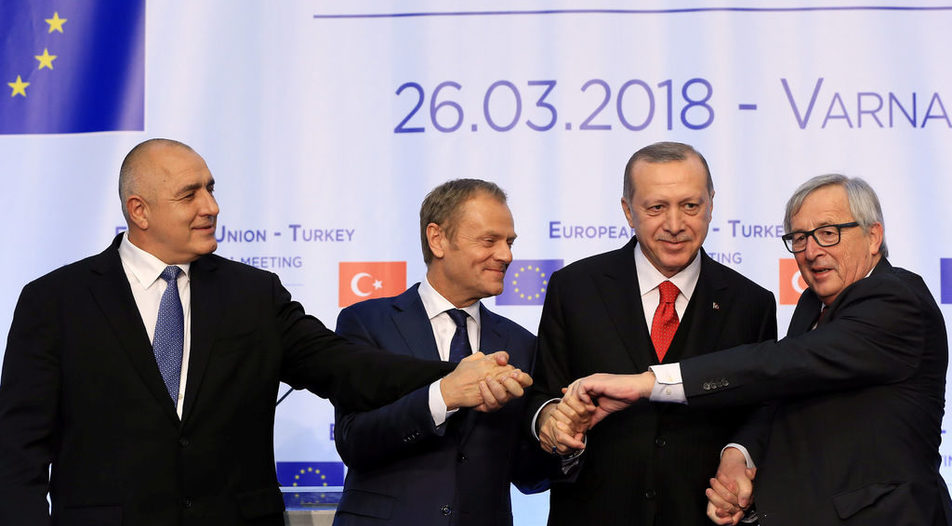Turkish business and households are heavily in debt, much of it denominated in foreign currency. External debt tops $466 bn - or more than half of GDP. Two-thirds of that amount is held by the private sector, a major beneficiary of cheap money flowing into the country. At the same time, corporate revenues are mostly in lira. A worst-case scenario may see a chain reaction where defaults harm banks and ultimately cause a general economic crisis.
Bulgaria is not exposed to the Turkish financial sector, as banks from across the border control only a negligible share of the Bulgarian market. Trade poses more serious risks, as Turkey is Bulgaria's most significant partner outside the EU. In 2017, Bulgarian exports reached four bn levs (two bn euro) in 2017, an increase of 10% in comparison to the year before.
The weakening lira will depress demand for Bulgarian imports as the lev, pegged to the euro, gains strength. A recession in Turkey will spell even more trouble, with consumption and manufacturing shrinking.
Blessing in disguise
The meltdown has positive political effects, however. Faced with a prospective crash at home, Erdogan has reached out to the EU. Relations have been normalized with Germany and the Netherlands. The contrast with the run-up to the jumbo elections on 28 June cannot be more pronounced.
In addition, Turkey has been trying to iron out problems with Greece. The two Greek soldiers detained at the common border in February are now free.
Erdogan finds himself on the same side with Europe in the trade disputes with the Trump administration. And the US is threatening further sanctions and punitive tariffs should pastor Andrew Brunson, accused of complicity in terrorism, is not released from detention. The spat with America drives up the EU's stock in Ankara.
The EU needs Turkey, too. Back in June, the EU okayed another tranche of three billion euro in compensation to Turkey, renewing the refugee deal struck in March 2016.
This political thaw serves Bulgarian interests well. It vindicates Bulgarian PM Borissov's overtures to Erdogan before and during the country's presidency of the Council of the EU in the first half of 2018. Though the summit in Varna, attended by Erdogan, Donald Tusk and Jean-Claude Juncker, achieved little of substance, the Bulgarian government can claim some of the credit for the rapprochement in the past few months. And the reduced number of asylum seekers entering via Turkey will, no doubt, be highlighted by Mr Borissov as a concrete deliverable.
There is a huge question mark how durable the present thaw is. It is not inconceivable that Erdogan may start blasting EU leaders anew - if he sees it opportune. Europe is in no mood to grant concessions to Turkey either. For instance, Brussels conditions the upgrade of the 1996 Customs Union on the improvement of human rights and democracy standards in the country. That is highly unlikely to happen.
Here is why the current financial crisis matters. If the EU becomes part of a rescue plan, through the IMF rather than bilaterally, its links with Turkey will only grow deeper. Erdogan will have an incentive to tone down rhetoric against Europe. And relations will be much less volatile, as a result. That will not be a bad outcome as far as Bulgaria is concerned.
* Dimitar Bechev is a research fellow at the Center for Slavic, Eurasian, and East European Studies at the University of North Carolina at Chapel Hill and a nonresident senior fellow at the Atlantic Council.
Turkish business and households are heavily in debt, much of it denominated in foreign currency. External debt tops $466 bn - or more than half of GDP. Two-thirds of that amount is held by the private sector, a major beneficiary of cheap money flowing into the country. At the same time, corporate revenues are mostly in lira. A worst-case scenario may see a chain reaction where defaults harm banks and ultimately cause a general economic crisis.
Bulgaria is not exposed to the Turkish financial sector, as banks from across the border control only a negligible share of the Bulgarian market. Trade poses more serious risks, as Turkey is Bulgaria's most significant partner outside the EU. In 2017, Bulgarian exports reached four bn levs (two bn euro) in 2017, an increase of 10% in comparison to the year before.












